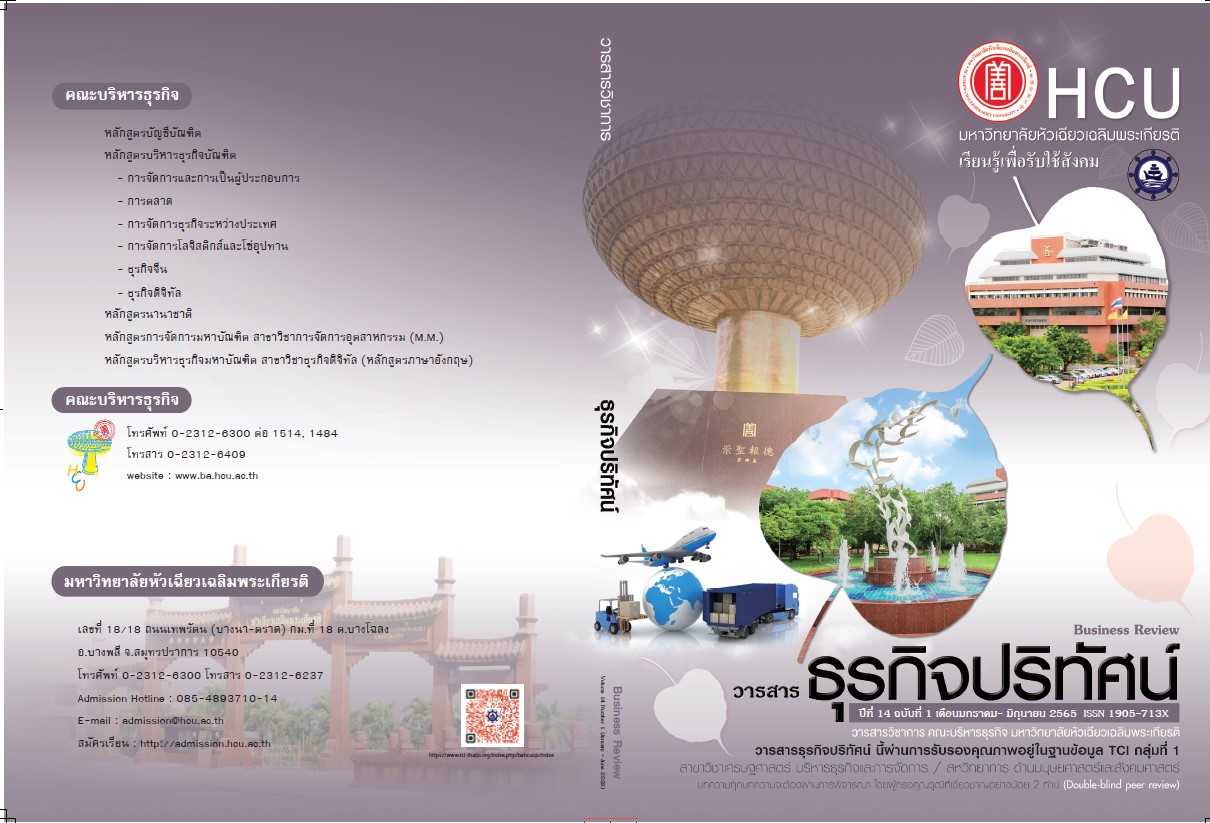Resilient Strategy of the Successful Business in the Community for Gen Y Entrepreneurs towards the New Normal in Chiang Mai Province
Keywords:
Resilient Strategies, Successful Business Community, Gen Y, The New NormalAbstract
This research focuses on the resilient business strategy in the community of gen Y entrepreneurs in Chiang Mai province. The qualitative method was sought for 23 key informants and used a template analysis approach and an inductive approach for data collection. The results of the presentation of the resilient strategy in a holistic dimension include a proactive family concept, the design way on an intelligent logistic system to deliver to customers on time hygienically, the self-care for both physical and mental health, continuous Learning and development, and the adaptation of thinking to support public applications for expenditure from the population. The final turnaround strategy in action was to prepare the production of quality products to be new, set a value price for the customers' needs and good service, build an honest network of contemporary culture preservation online for creating a positive customer experience, hear the customers’ voice, group customers for thorough care, and be a good consultant. The additional results found a careful turnaround, word-of-mouth resurgence in gen Z viral marketing, and exceeding services expectations in a new normal.
References
กรมควบคุมโรค กระทรวงสาธารณสุข. (2563). รายงานสถานการณ์โควิด-19, 21 พฤษภาคม 2564 เว็บไซต์: https://ddc.moph.go.th/viralpneumonia/file/situation/situation-no502-190564.pdf
การเคหะแห่งชาติ. (2562). ข้อมูลประชากร, 21 พฤษภาคม 2564 เว็บไซต์: https://housingkc.nha.co.th/files/article/attachments/ded559b09e13fee63fda3533bb7d0069.pdf
ชมพูนุท ศรีจันทร์นิล. (2562). การวิเคราะห์เชิงปรากฏการณ์วิทยาแบบตีความ: เกณฑ์ประเมินคุณภาพ. มนุษยศาสตร์สาร, 20(1), 1-25.
พงศธร อุปถัมภ์. (2559). ความสมดุลย์ระหว่างชีวิตและการทำงานของเจนเนอเรชั่นวายในอำเภอเมืองเชียงใหม่. ปริญญานิพนธ์บริหารธุรกิจมหาบัณฑิต, มหาวิทยาลัยเชียงใหม่.
เฟื่องฟ้า ปัญญา. (2563). การทำธุรกิจของผู้สูงวัยที่ประสบความสำเร็จ: การวิจัยแบบพหุกรณีศึกษา. วารสารพัฒนาทรัพยากรมนุษย์และองค์การ, 12(1), 1-29.
วิไล พึ่งผล. (2561). สมรรถนะทางปัญญาของผู้ประกอบการยุคใหม่สำหรับ SMEs ไทยเพื่อผลประกอบการธุรกิจในยุคประเทศไทย 4.0. ปริญญานิพนธ์ปริญญาดุษฎีบัณฑิต, มหาวิทยาลัยศิลปากร.
วิไล พึ่งผล และ ประสพชัย พสุนนท์. (2560). การวิเคราะห์คุณลักษณะของเจนเนอร์เรชั่นวายยุคประเทศไทย 4.0 กรณีศึกษานักศึกษาชั้นปีที่ 4 มหาวิทยาลัยเอกชนแห่งหนึ่ง. วารสารการวิจัยเพื่อพัฒนาชุมชน, 11(2), 152-169.
วิไล พึ่งผล. วิโรจน์ เจษฎาลักษณ์ และ จันทนา แสนสุข. (2563). การพัฒนาสมรรถนะทางปัญญาเชิงธุรกิจสำหรับผู้ประกอบการ SMEs ไทยยุคใหม่เพื่อผลประกอบการในยุคประเทศไทย 4.0. วารสารวิทยาลัยดุสิตธานี, 14(2), 341-360.
สำนักงานคณะกรรมการพัฒนาการเศรษฐกิจและสังคมแห่งชาติ. (2562). การคาดประมาณประชากรของประเทศไทย พ.ศ. 2553-2583. โรงพิมพ์เดือนตุลา: กรุงเทพมหานคร.
Braun, V., & Clarke, V. (2006). Using thematic analysis in psychology. Qualitative Research in Psychology, 3,77–101.
Brodeur, A., Gray, D., Islam, A., & Bhuiyan, S. J. (2020). A Literature Review of the Economics of COVID-19, Retrieved May 21, 2021, from IZA – Institute of Labor Economics Website: http://ftp.iza.org/dp13411.pdf
Brooks, J., & KING, N. (2017). Template Analysis Business and Management Students. London: SAGE.
Creswell, J. W., & Poth, C. N. (2018). Qualitative Inquiry and Research Design Choosing Among Five Approaches. California: SAGE Publications.
Cusmano, L., & Raes, S. (2020). Coronavirus (Covid-19): SME Policy Response, Retrieved May 21, 2021, from OECD Centre for Entrepreneurship, SMEs, Regions and Cities (CFE) Website: https://www.oecd.org/coronavirus/policy-responses/coronavirus-covid-19-sme-policy-responses-04440101/
Donthu, N., & Gustafsson, A. (2020). Effects of COVID-19 On Business and Research. Journal of Business Research, Elsevier, 117,284-289.
Fzlinda, F. N., Hanim, K. H., & Juliana, L. (2020). The Impact of Covid-19 Pandemic Crisis on Micro-Enterprises: Entrepreneurs’ Perspecitve on Business Continiityu and Revocery Strategy. Journal of Economics and Business, 3(2), 837-844.
Hughes, R. (2020). Get a Life!: Creating a Successful Work-life Balance. London: Kogan Page.
Ketchen, D. J., & Craighead, C. W. (2020). Research at the intersection of entrepreneurship, supply chain management, and strategic management: Opportunities highlighted by COVID-19. Journal of Management, 46(8), 1330-1341.
Kovacic, D. (2018). Using the content validity index to determine content validity of an instrument assessing health care providers’ general knowledge of human trafficking. Journal of human trafficking, 4(4), 327-35.
Kuckertz, A. Brändle, L., Gaudig, A., Hinderer, S., Reyes, C. A. M., Prochotta, A., Steinbrink, M. K., & Berger, E. S. (2020). Startups in Times of Crisis- A Rapid Response to the Covid-19 Pandamic. Journal of Business Venturing Insights, 13, 1-13.
Lowe, A., Norris, A. C., Farris, A. J., & Babbage, D. R. (2018). Quantifying Thematic Saturation in Qualitative Data Analysis. Field Methods, 30(3),191–207.
Macmillan, T.T. (1971). The Delphi Technique. Paper Presented at the annual meeting of the California, Junior Colleges Associations Committee on Research and Development, Monterey, (pp. 3-5), California.
O’Kane, P., Smith, A., & Lerman, M. P. (2021). Building transparency and trustworthiness in inductive research through computer-aided qualitative data analysis software. Organizational Research Methods, 24(1), 104-139.
Pagis, M. (2020). Inhabiting the Self-Work Romantic Utopia: Positive Psychology, Life Coaching, and the Challenge of Self-Fulfillment at Work. Work and occupations, 48(1), 40-69.
Porter, M. E., & Kramer, M. R. (2002). The competitive advantage of corporate philanthropy. Business Review, 80(12), 56-69.
Singh, J., Nambisan, S., Bridge, R. G., & Brock, J. K. U. (2020). One-Voice Strategy for Customer Engagement. Journal of Service Research, 24(1), 42-65.
Downloads
Published
How to Cite
Issue
Section
License
Copyright (c) 2022 Business Review Journal

This work is licensed under a Creative Commons Attribution-NonCommercial-NoDerivatives 4.0 International License.
All articles published in the Business Administration and Management Journal Review are copyrighted by the journal.
The views and opinions expressed in each article are solely those of the individual authors and do not represent those of Huachiew Chalermprakiet University or any other faculty members. Each author is fully responsible for the content of their own article. Any errors or issues found are the sole responsibility of the respective author.




